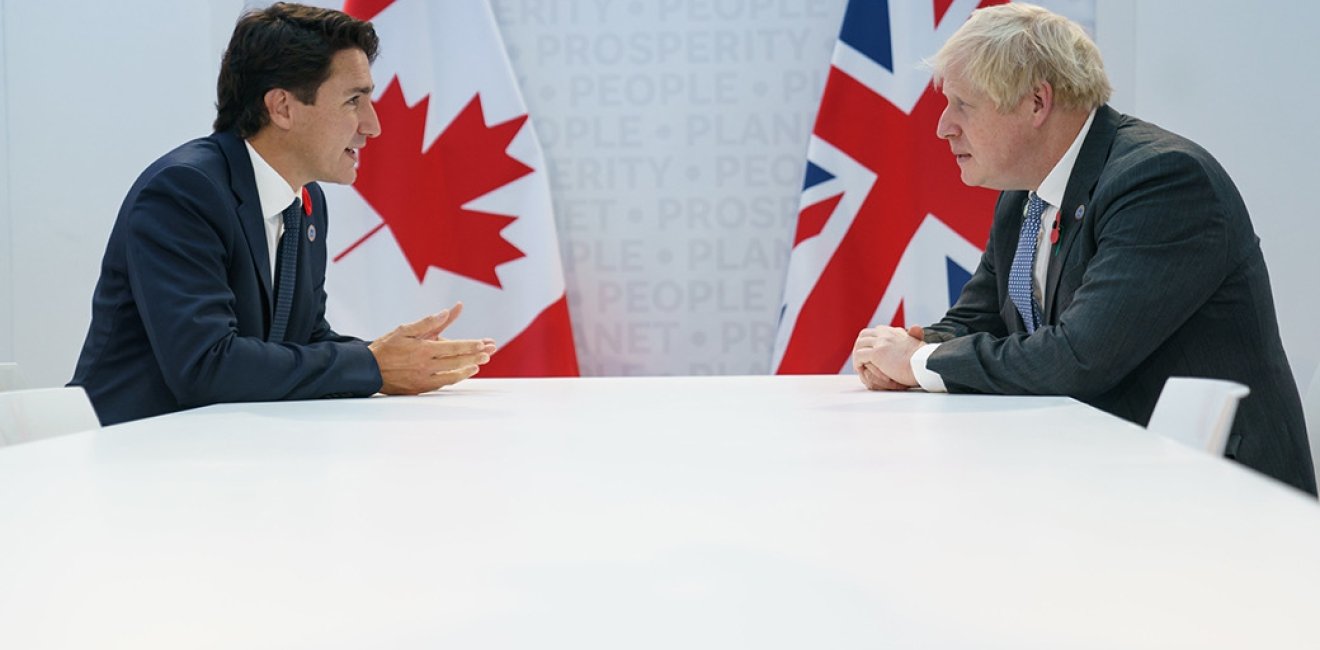Over the past few years, the United Kingdom has faced two unprecedented challenges to its position as a global power: Brexit and COVID-19. The combination of the pandemic and the negotiation of Britain’s departure from the EU (European Union) has created a climate of uncertainty and has had a significant impact on the passage of both goods and people across international borders. The United Kingdom must redefine crucial trading relationships with North America to establish a new, independent reputation for Britain beyond the trade conditions of the European Union. Will historic allyship be enough to preserve and renew the Trans-Atlantic trading relationship, or is a new framework needed?
As longstanding allies with steadfast shared interests on the global stage, the ties between the United States, Canada and their neighbors across the Atlantic have been reinforced throughout history and the maintenance of positive working dynamics between the countries continues to serve the best interest of all involved. However, the enforcement of border restrictions as a result of the COVID-19 pandemic, as well as ongoing negotiations and implementation of post-Brexit trade deals have strained these relationships in a way that has not been seen since wartime.
Prime Minister Boris Johnson has spent the past four years scrambling together new trade agreements for the UK following the Brexit vote to leave the European Union. It appears that the British PM must re-approach President Biden, after an unproductive meeting at the White House prior to the UN General Assembly. The main point of contention between the two leaders is the ongoing debate over the Northern Ireland protocol. The Biden administration has made its standpoint clear on the matter of EU customs within the UK territory, emphasizing that in trade negotiations the UK must “prioritize stability”[1] in Northern Ireland above all else. The position of the United States on the matter of Brexit was set by President Obama, who expressed at the beginning of the Brexit transition period in 2016 that the UK would be “at the back of the queue”[2] for a trade deal with the United States after leaving the European Union. With the upcoming 2022 midterm election and ongoing bipartisan conflict over Biden’s domestic agenda in the United States, a bilateral trade deal with the United Kingdom will not be reached in the near future, particularly while PM Johnson remains unable resolve on the issue of the Northern Irish border.
The issue of the Northern Irish border has also been explicitly raised in trade negotiations between the United Kingdom and Canada. For the United Kingdom, it has become clear that there is still much to be done in the negotiations over Northern Ireland to appease not only the two sides involved, but also global trading partners with vested interests, such as Canada and the United States. The relationship between Britain and Canada is not often discussed on a beyond the Commonwealth, however, the need for a renewed trading agreement has shone a new light on the Transatlantic partnership. Throughout his time as Prime Minister, Boris Johnson has worked alongside PM Trudeau on a bilateral level as well as on the global stage while working together as members of the UNGA, G7, G20 and NATO. These preexisting areas of international partnership make the United Kingdom and Canada obvious partners in trade, as well as other areas of cooperation.
Regarding the conditions of Brexit, Justin Trudeau’s government has emphasized the importance of preserving the integrity of the Good Friday agreement.[3] However, the impasse over the Northern Ireland protocol did not prevent the United Kingdom and Canada from reaching a post-Brexit trade agreement; beginning in April 2021, the Canada- United Kingdom Trade Continuity Agreement (often referred to as the TCA) preserved the trade relationship between the two countries, to the relief of Britain. This agreement was shortly followed by the UK-Mexico Trade Continuity Agreement that came into effect in June 2021. These agreements generally replicate the pre-Brexit trade conditions, essentially renewing the United Kingdom’s access to the North American market, rather than providing Mexico and Canada with any increased dividends.
In the aftermath of the UNGA meeting, which yielded little commentary from either government other than confirmation that trade negotiations are ongoing,[4] speculation emerged that the UK may make a bid to join the United States Mexico Canada Trade Agreement (USMCA). The USMCA, which passed its one-year mark in July 2021, replaced the former North American Free Trade Agreement with updated terms to benefit the United States, Canada and Mexico. Unfortunately for PM Johnson, longstanding allyship will not suffice in securing a trade agreement between the United States and the UK, let alone in gaining access into the USMCA. Following the rumors of the UK angling to join the USMCA, Mexican President Andres Manuel Lopez Obrador immediately responded that he is “in favor of maintaining this agreement,”[5] referring to the existing USMCA deal and presumably not expanding beyond its three current participants. These speculations were not received well by Mexico and Canada; a bid by the United Kingdom would imply that the USMCA could be used as a back door to a trade deal with the United States, particularly as Boris Johnson has already negotiated preferential trade deals with Canada and Mexico individually.
“Brexit means Brexit,” a phrase first coined by former Prime Minister Theresa May (who oversaw the initial phase of the negotiations for Britain to leave the EU), is a sentiment that has been strongly reinforced throughout Boris Johnson’s tenure- there is no going back on the decision made by the British public in 2016.[6] From this standpoint, Johnson must negotiate to secure new trading conditions for the United Kingdom that deliver on the promises of the Brexit vote. Although the trade deals forged by the United Kingdom with Mexico and Canada largely replicated the preexisting agreements, the United Kingdom recently struck the first entirely “new” trade deal post-Brexit in its negotiations with Australia.[7] While the deal itself will reduce export and import tariffs as well as promoting additional trade between the two countries, it will also aid in the United Kingdom’s effort to join the Comprehensive and Progressive Agreement for Trans-Pacific Partnership (CPTPP).[8] For the United Kingdom, joining the CPTPP is a much more realistic foray than the slightly whimsical aforementioned quest to join the USMCA pact.
Although the CPTPP and USMCA agreements offer vastly different trade conditions, they share two key members: Mexico and Canada. Many have posed the question as to whether the third Amigo of the USMCA would seek to rejoin the agreement (formerly the TPP), in addition to the United Kingdom’s bid. As with the TCA, the entry of the United States and/or United Kingdom into the CPTPP would not drastically change the access granted to Canada in these countries. Furthermore, there is no incentive for Canada to provide increased market access to the United Kingdom beyond the TCA. However, the CPTPP (and subsequently Canada) would benefit from the addition of the United States and United Kingdom, members that would make the CPTPP even more appealing to other potential members. For this reason, it seems probable that Canada will support the United Kingdom’s bid for membership to the CPTPP. A relationship between the UK and Canada that is no longer predominately bilateral is a realistic representation of the current international trade environment.
Going forward, trade relationships between North America and the United Kingdom will remain in flux, at least for the foreseeable future. Despite this, it has become clear that a fundamental aspect of strengthening these ties is the renewal of past agreements and the continued shift away from dependence on bilateral relationships. Although the United Kingdom and Canada face different issues continentally, both nations must establish their positions as independent trading powers, needing to prove themselves on the global stage in a way that the United States does not. Neither Canada nor Britain cannot solely rely upon their respective continental domestic markets and thus must look beyond continental agreements of the USMCA and EU markets to diversify supply chains. For both the United Kingdom and Canada, entering into agreements such as the CPTPP is the most beneficial step in reducing their reliance on bilateral trade relationships.
[1] https://www.politico.eu/article/us-secretary-of-state-hails-uk-alliance-ahead-of-g7-meetings/
[2] https://www.theguardian.com/politics/2016/apr/22/barack-obama-brexit-uk-back-of-queue-for-trade-talks
[3] https://www.politico.eu/article/canadian-prime-minister-justin-trudeau-raises-northern-ireland-brexit-row-g7-meeting-british-prime-minister-boris-johnson-uk/
[4] https://www.bbc.com/news/uk-politics-58646017
[5] https://www.reuters.com/world/americas/all-countries-should-be-consulted-about-uk-inclusion-usmca-pact-mexican-2021-09-23/
[6] https://www.theatlantic.com/news/archive/2017/01/theresa-may-brexit/513314/
[7] https://www.bbc.com/news/business-59690080
[8] https://www.bbc.com/news/57173498








